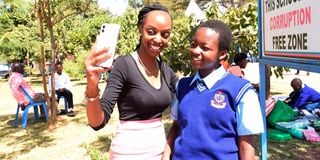Boarding schools: Realities and reimagining the future

Moi Girls School Nairobi Form One student Emmanuela Akweyu takes a selfie with Racheal Wanjiru during her admission on February 6.
On February 6, 2023, I took my son Mordecai to join high school. We arrived at the school in the haze of the blazing sun—a shiver of bright glass scorching a path through a fervent blue sky, leaving a shimmer of brightness in its wake, threatening to rain down a shower of sparks, fire, and brimstone.
The school sat on several acres of land; colourful buildings with unique architectural designs and muted walls, surrounded by winding and lush treelined areas. The horizon appeared washed in whiteness like a photo taken at dawn in the first white light.
The schoolyard felt vaguely giddy, spiritual, and surreal, as if we were approaching something sacred. It was quiet. Some Form 2 students lined the driveway, welcoming the new Form 1 students. The Form 2 students helped us drag a stuffed, four-wheeled suitcase accompanied by other essentials.
The registration process was quick, almost rhythmic—each attendant like a member of a choreography group. They didn’t struggle as they followed the onslaught of modern-day names. The boys seemed to have a sense of total calm, even detachment.
Their parents, however, were not so calm—mothers, especially, looked jittery and palpably nervous with a glazed, far-away look—there was something uneasy about the mothers’ poises as if doubt was knotting itself in their minds.
New students
Unlike their mothers, the new students seemed to be at ease. Energetic and heady, standing next to their parents, the boys looked like upgraded heirs, unequivocally the modern heroes—fresher, smarter. The parents looked a bit weathered and probably less idealistic, with their ambitions somehow muffled by the passing of years or by reality—the indelible feeling of what might have been that never was.
Some of the boys took photos with their families and sometimes with other students. They took playful, hyper-masculine poses, sometimes with their hands across their chests, tilting their chins slightly up or pocketing. They smiled for the cameras on cue—sometimes the smile turning into grins, eyes glistening in the sun.
All this reminded me of the novel In Between Dreams, a work of dark, smouldering genius by Nairobi-based writer Iman Verjee. It’s an appropriate title because thousands of parents recently took their sons and daughters to boarding schools to join secondary school. “In between dreams” connotes that they are no longer in childhood but also not yet in real adulthood—they are in between places.
If they were transiting between houses, they would be like one who has half-moved out and half-moved in. When young, our ambitions are irreducible and absolute, lush, and vast—as varied as different strains of music in violins, guitars, flutes, and harps. This energy in teenagers needs to be channelled for them to overcome the pain, perils and challenges on their path to destiny.
Destiny is mysterious, the outline of which we can’t necessarily discern for our children now—the path is windy, up mountains and down valleys as if undecided about the destination. Some people are lucky to live under blue skies with puffy white clouds, in fields of fragrant wildflowers and green rolling hills with few struggles. Others live a scattered life, living here and there—always looking for something.
In the novel In Between Dreams, the focus is on Frances. The girl has strange behaviour: friendless, manipulative, and occasionally cruel. After a disastrous 16th birthday party and a grandmother found dead in the bathtub, a decision is made to send Frances away to boarding school.
Maybe with the hope that boarding school will distract her from her turbulent past as her sense of self was confused. However, the boarding school she attends is a place rife with teenage competition, secret dates, and budding friendships. While in boarding school— alone for the first time—Frances is forced to confront her dark past as a survivor of child abuse.
Lyrical details
Frances’ life is like one of the caves she discovers, which the writer describes in lyrical details, “I discovered this cave a few weeks back… There was something about its secrecy, the musty, enclosed space of it, that made it feel like it was alright to be alone—like being lonely was something special. But now, the darkness is too pressing. I tilt my head back and force out a scream and the resounding noise just reminds me of my isolation”.
Frances’ life is like her scream in the cave; she is crying out for help. She is probably trying to quieten the frightened voice inside. The novel reminds us of the brutal reality of life and the thin line between normal and perverse relationships.
One of the lessons from the novel is that as parents leave their children in boarding schools, they should ensure that all is well, especially their mental health. Parents should listen more to their children, sometimes they are dealing with challenging situations parents know nothing about.
The second lesson is that all children (like Frances in the novel) have dreams, and as Lupita Nyong’o famously said, “All dreams are valid”.
In his book, The Talent Code, Daniel Coyle stresses that “greatness isn’t born. It’s grown”. One of elements he singles out that teens can benefit from is “ignition”. This is motivating and spurring teens to aspire to greatness as someone aptly put it: “Aspire to inspire before you expire”.





